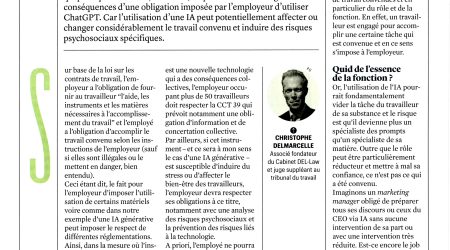Is a non-solicitation of clients clause valid?
Posted the 8 May 2025A non-solicitation clause is one whereby the employee agrees not to solicit the clients, suppliers, and employees of their (former) employer during and/or after the termination of the employment contract. It is often accompanied by a prohibition on working with or hiring these individuals.
Such a clause is not regulated by the Law of 3 July 1978 on employment contracts.
To the extent that it reflects the employee’s duty of loyalty, such a clause is, in my view, valid as long as it applies during the term of the contract. As a reminder, in any case, the employee may not engage in any act contrary to the interests of the employer.
Its validity after the end of the contract, however, is more debatable.
On the one hand, because poaching is in itself legal and inherent to the freedom of commerce and industry established by the Decree of Allarde of 2 March 1791. Both clients and employees are, in principle, "fair game".
On the other hand, because the law on employment contracts only prohibits unfair competition and strictly defines the validity conditions for a non-compete clause (geographical limitation, time limitation, financial compensation, and legitimate interest).
Some argue that since the non-solicitation clause is not prohibited by law, it is therefore allowed by default. However, this overlooks Article 6 of the law, which provides that any provision contrary to the law and that limits the employee’s rights or increases their obligations is null and void. As the non-solicitation clause goes beyond what the non-compete clause allows—namely, only prohibiting work for a competitor—it increases the employee’s obligations.
In a 2022 ruling, the Labour Court of Mons held that such a clause, which was not limited in time or geography and did not provide financial compensation, was void as it disproportionately restricted freedom of commerce. That said, the court did not establish a general prohibition of such clauses. Such a prohibition could, however, result from a 22 September 2008 ruling by the Court of Cassation, the scope of which remains debated.
One may still come across such clauses in agreements signed after the contract has ended, in which case the employer has more leeway, as Article 6 does not apply.
Finally, even if such a clause were considered valid, its enforcement could still constitute an abuse of rights, especially if it serves only a malicious purpose or results in a clear imbalance between the benefit gained by one party and the harm caused to the other.
In any case, care must be taken not to include a poaching prohibition within the non-compete clause, as this could render the latter invalid due to the strict legal definition. The scope of the clause should be clearly defined, and if it applies post-contract, a fair compensation should be provided.
A penalty clause should also be added, stipulating a fixed indemnity in case of breach.
Related articles

Is an employer allowed to mandate the use of artificial intelligence tools by employees ? (Trends, 17-07-2025)

Caution if a former colleague opposed to your employer asks you to testify in their favor
